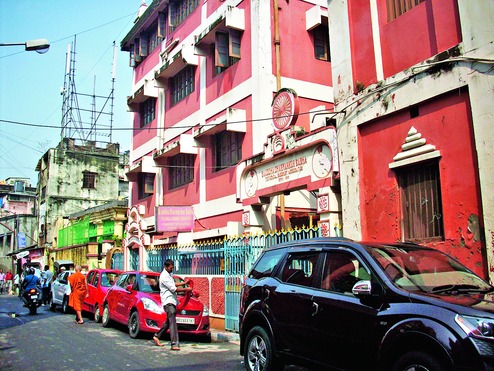
.jpg)
Thanks to Anjan Dutt's film Bow Barracks Forever, most people know the story of central Calcutta's Bow Street - how it used to house the army messes during World War I and thereafter, and how it became the home of the Anglo-Indian community. In fact, around Christmas time, many people from other parts of the city still come here to participate in the celebrations.
But if you go slightly deeper into the neighbourhood you will be pleasantly surprised by two nowhere-close-to-famous old-world haunts - the Manackjee Rustomjee Dharamshala for Parsi travellers on 9, Bow Street and the Bauddha Dharmankur Sabha on 1, Buddhist Temple Street.
The Parsi dharamshala was set up in 1909 in memory of the late Manackjee Rustomjee by his friends and admirers in Bombay, Calcutta and China, says Noshir Wadia, a trustee of the Calcutta Zoroastrian Community's Religious and Charity Funds that maintains the place.
Incidentally, the first Indian sheriff of Calcutta was called Manackjee Rustomjee. His son, Hiramjee Manackjee Rustomjee, was also the sheriff at some point before he passed away in 1904. Is he the one after whom the dharamshala has been so named? The records are silent.
What the trust documents do say, however, is that the original building was demolished and the present one designed and constructed by one Ardeshir Dinshaw Vehvalvala, architect and civil engineer. "This dharamsala was founded with the primary objective of providing Parsi travellers visiting Calcutta a comfortable place to stay," says Wadia. The rent of a room used to be eight annas a day - an anna being one-sixteenth of a rupee - and the charge of three full meals was all of Rs 2. After 1936, the room rent was increased to 12 annas and the charge for three meals was revised to Rs 3.50.
More than a hundred years old, the dharamshala is well-maintained and has a decent number of rooms and dormitories. The room rates, like the rooms, come sans frills. Caveat: you can stay here only if you are a Parsi or you are married to one. The good news, though, is you don't have to check either of the two boxes if you just want to feast on dhansak and laganu custard. Just let them know a day in advance. "If you want any fish dishes you will have to give me two days' notice," says Meher D. Hansotia, the resident manager.
If you are not a Parsi but still looking to stay in that area, then the Bauddha Dharmankur Sabha could be an option. It is an oasis of quiet just behind the buzzing Bowbazar Police Station.
The place was set up in 1892 by a Buddhist monk, Kripasaran Mahasthavir. It seems, Kripasaran bought a rundown house built on five cottahs on this very spot. This was torn down to build the Dharmankur Vihara. Later, the Raja of Cossimbazar threw in six more cottahs and on it stands the building that houses the guestrooms. The building itself, with its distinct Buddhist architecture, was sponsored by the Birlas.
The Dharmankur Sabha has rooms to let out if you are willing to live by the rules it lays down, the most crucial being that the gate will be locked at 10.30pm sharp. A lot of students appearing for competitive exams put up here. "We also get a lot of people who come here for treatment," says Hemendu Bikash Chowdhury, general secretary. "Most people hear of this place by word-of-mouth." Imagine, in this day and age!
Bang in the middle of Burrabazar is the saraikhana (inn) of the Gurdwara Bara Sikh Sangat. This gurudwara, possibly the oldest in Calcutta, is believed to stand on the very spot where Guru Nanak addressed hundreds in 1510. An epidemic had broken out in the area and legend has it that the local ruler, Raja Padmal Khatri, invited the first Sikh Guru to heal his subjects. Guru Nanak stayed here for 12 days, blessing people and gathering disciples and soon after the epidemic ended.
But it was the ninth guru, Guru Tegh Bahadur, who started the tradition of holding langars twice a day here; a free sit-down meal comprising daal, sabzi, roti and either halwa or kheer. The best aspect of staying in this saraikhana is the free food. "All our guests get tea at 8am, lunch at noon and dinner at 8pm," says Daljit Singh, head granthi at Gurudwara Bara Sikh Sangat.
There is a big hall in which you can stay for a nominal amount and there are a couple of rooms too. "We don't take bookings," says Singh. "Anyone can walk in and get a room but only if we have any space. And that we usually do, except around the time of Ganga Sagar Mela, when we are full beyond capacity."
So now you know? There's more to Bow Barracks than Bow Barracks.











